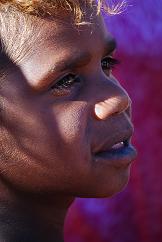As a lecturer in the ANU Medical School Peter tells his students that they should not feel guilt or blame for the policies or actions of past Australian governments and other agencies. However, he asserts that they must be mindful of the impact that these policies and actions have had, and continue to have, on Indigenous health today.
"The policies of previous Australian governments and other agencies provide the historical context which is paramount to understanding the 'burden of disease' Indigenous people carry today," says Peter. He concurs with other Indigenous health experts who claim that the status of contemporary Aboriginal health is not a consequence of indigeneity but rather due to historical facts.
These historical facts are deeply imbedded in the processes of Australian colonialism. The relationship between colonialism and the contemporary 'burden of disease' is recognised by the Medical Deans of Australia and New Zealand - Indigenous Health Curriculum Framework, which forms the basis of the Indigenous health curriculum in the ANU Medical School. A core rationale of the framework is that one of the most apparent impacts of colonisation is the poor health outcomes of Indigenous Australians.
"An example of that is for me personally living here in Canberra that when the intervention (in the Northern Territory) came in during 2007 it had an impact upon me, even though it affected the people in the Northern Territory more directly," says Pinnington.
"That is the sort of history that we all carry around with each other, Indigenous people in Australia. We have our own unique experience of colonisation and history, and we also have a shared history of colonisation.
"This is a situation which also finds expression in nearly all contexts of colonialism across the world," he adds. "(In 2008) I attended the Pacific Region Indigenous Doctors Congress in Hawaii and talking to fellow Indigenous people from other countries there was just like talking to fellow Indigenous people here in Australia. We have that shared history of colonisation across the world."
The policies and actions of colonialism have left socio-economic legacies that are irrefutably linked to the 'burden of disease' now suffered by Aboriginal Australians. Another profound impact is that the very process of colonialism and 'settlement' - the dispossession of land, the disruption of the connection to traditional country, and the denial of self determination - resulted in an inability for the Indigenous population to express health and well-being in their own terms.
Peter asserts that health for Aboriginal people is a matter of determining all aspects of an individual's life, including control over the physical environment. It also encompasses notions beyond the provision of medical infrastructure, including social and cultural vibrancy; the sustainability of whole communities; and a sense of community self-esteem and justice. These sentiments are encapsulated in the National Aboriginal Health Strategy of 1989.
Currently, the denial of self determination and lack of control over all aspects of an individual's life find expression in the manner via which Indigenous health issues are often treated by authorities and agencies charged with solving them.
"Indigenous people know the solutions most of the time but are not involved in the solutions. Usually programs are done very piecemeal with a particular aim, but they don't look at the determinants behind the situations such as environmental and social factors," says Peter.
For Peter, who advocates the Indigenous holistic health approach, treating contemporary Indigenous health problems is a process that should involve engaging local communities, listening to Aboriginal people and conducting meaningful consultation.
"When I teach my students as a person with my own experience of colonisation, I tell them that it is difficult for other people to understand what that word colonisation means," he explains. "So what I tell the students in relation to Indigenous health is that they can empathise but they are unable to sympathise because they are not in the same situation that I am.
"We only have 140 doctors and 140 Indigenous students studying medicine and we are 2.5% of the Australian population," Peter explains. "Through working collaboratively with culturally competent medical practitioners Indigenous health outcomes will improve. However, this will require constant work and more than the span of one generation."




















